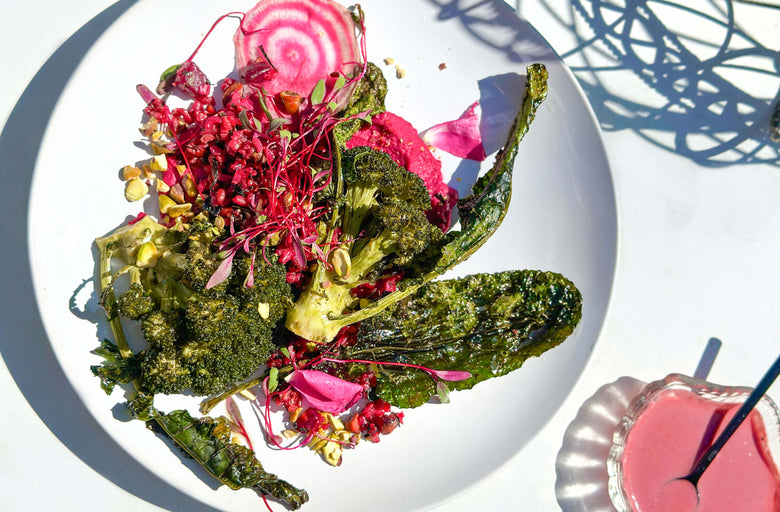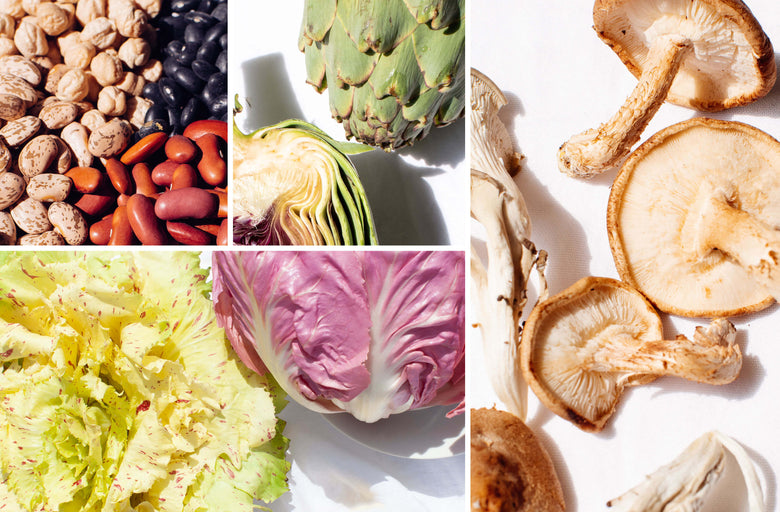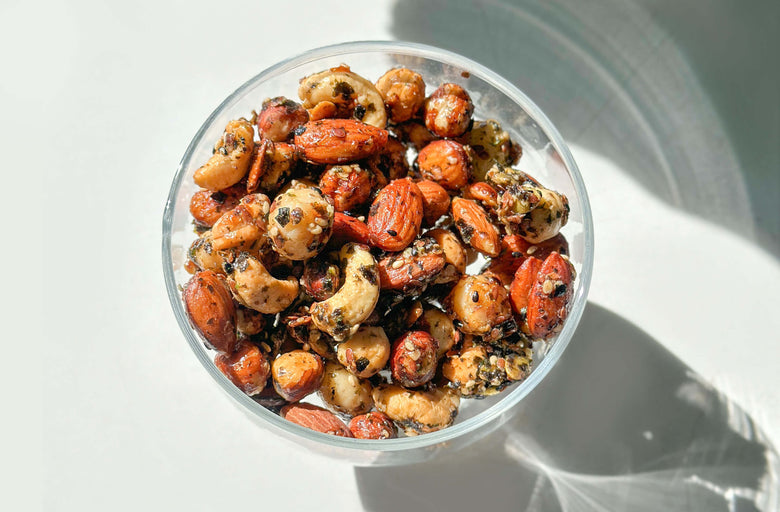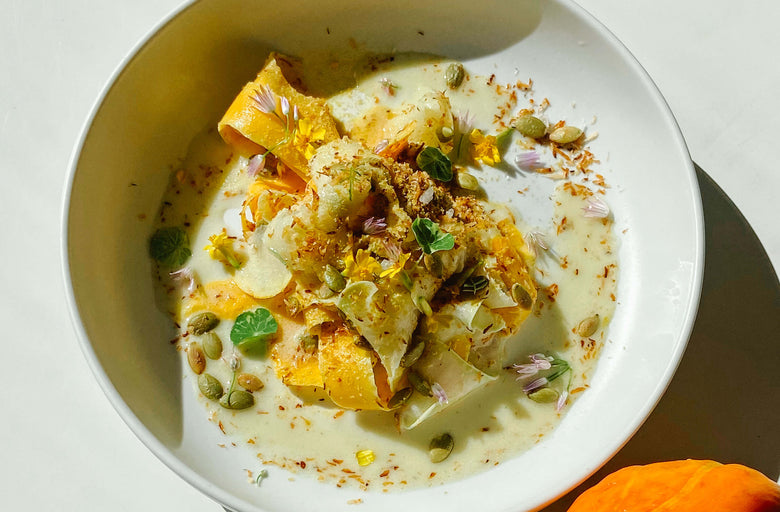Domino Kirke is everything, literally. A quadruple threat, if you will. Mother, lover, musician, doula. Domino's passion for nurturing others was reawakened after she had her son at 24, and she went on to pursue what she realized was her natural calling—becoming a doula. She now spends her days dashing around New York City, educating women and comforting the mothers that come to her collective, Carriage House Birth, while her nights are spent caring for her son and the other loved ones in her life. That may not leave her with much time for herself, but she wouldn't have it any other way.
What's the journey been like to where you are now?
Pretty much everything before I had my son was very driven toward a career in music. I went to school for music, piano and voice. I wanted to be a singer. It was just crazy because really, in hindsight, I look back and I was just looking for a family to become a part of. I was a front woman, but I loved being in a band setting. I was being matched up with all these songwriters and all these people that wanted to shift and and shape me, and I ended up writing songs with a friend and we formed a band named Domino. Amy Winehouse had just riffed on her record with us in the same studio — it was wild.
But I was completely unsure the whole time. I grew up around a lot of people in the industry, so I was like, ‘Eh…this isn’t it.’ The closer I got to it, the more I questioned it. I think that’s human nature. We ended up making a record and then, we weren’t dropped, but we were kind of put to the side — shelved until certain other records were ready. Then we went on a bunch of tours, then came back, and I looked at everyone and the whole thing and was like, ‘I’m done. I don’t know why but this just isn’t my journey.’
I ended up meeting my son’s father on the subway. He’s a bluegrass musician, but he would hate if I said that — he’s a "browngrass" musician. He’s his own thing. I saw him and his band but I always kept walking, and then months went by and I was finally like, ‘Okay, I’m just going to stop this time and listen.’ I had bought a CD so I knew the words, I knew everything about them, and finally this time, he didn’t look as occupied. I picked up on all the right stuff, and he felt more welcoming, so I approached him and I gave him a bite of my apple because I didn’t have any money to give. I was just being 22-year old me, so I went up to him.
I looked like crap, but I was like, ‘Here, this is a really good apple.’ I gave him a bite and kissed him on the lips and ran. It was nuts. Then I played a show at a venue that was around for years, called Zebulon — it was in Williamsburg and it was definitely a haven for a lot of people for a long time. I played one of the first shows ever there. He actually just happened to come that night through friends telling him to come see a show, and it was me. Then we left, and had a baby a year later. Once I had him, I left the whole band thing behind and just kind of said, ‘I’ve got other plans…’ and toured with the bluegrass band across the country, playing a washboard and spoons, and it was awesome. It was what I needed. I needed to just kind of air out that whole world and get back to why I love playing music. So I did that, and had my son in January of 2009.

How did you get into doula work?
I was always interested in being a midwife, but I thought I would have the time in my twenties to go back to school. It felt like a big plan C. I was like, ‘Okay, I’m going to have a baby and then see if I’m as moved by that work,' — and it was tenfold. I had an extremely challenging labor and delivery that was actually life-threatening, so by the end of it, I needed to step back and really figure out how I was going to claim my power again, because I just felt like many women do with their first baby: they feel kind of depleted and like they’re grieving their old selves, and they’re not who they were before they had babies and they have no idea who this new woman is. I was definitely in a threshold — a holding place — for at least the first six months.
A friend of mine was like, ‘Well, it sounds like what you were lacking was just some female support.’ I didn’t grow up with a super close relationship with my mother, so I relied on my siblings for that, and I’m the oldest of the girls. So for me, it was always about taking care of everyone else. A friend of mine who’d been a doula for years said, ‘You have that chip in you — you’re just a caretaker. Good or bad, you don’t want to do it all the time, but you can actually get paid for this…’ I was like, ‘Really?’ But I also just thought that my birth was too traumatic to come back to, and I was still processing it. I ended up going to just one birth and it ignited something in me.
After attending that birth, I ended up attending another one, and another one. Before long, I’d attended a handful and I was like, ‘This is really hard work!’ As a mom, breastfeeding with milk coming out all day long and being at births without my kid there, I just felt like this lactating thing running around the city helping everyone else. It was just too much, so I took on a partner who ended up becoming my partner still today, and she and I would back each other up. In the doula community, that’s the biggest thing — because it’s kind of lonely work, in that it’s so self-motivated, so you go to a birth and you hope to God that everything goes well, but if it doesn’t, you might be there until three in the morning, coming home and just wanting to die. It can be tough! So to have someone to call and just lose it with on the phone, or to just be like, ‘I don’t want to go back to my house, can I come to yours?’ And you get there and they’ve cooked you a meal or whatever. That suddenly became everything for me.
My partner at the time had no idea. He had witnessed me in labor, but he couldn’t imagine what it was like for me to be taking on these other women and coming home and needing to make dinner for my son — it was just a lot. Slowly but surely we decided to build Carriage House, which we now call a "village," and we’ve got doulas at every experience level, every tier, and they all back each other up for various reasons. We have 45 in New York now, and we have 40 in LA, and we’re opening in Virginia because we have a postpartum retreat space there now so once you have your baby, you can go and recover — whatever that means to each mom. We were definitely like, ‘The village is growing and it’s kind of amazing because it was born out of something that felt so temporary.’ I thought doula work was going to be a little bit of a lily pad for me to go on and become a midwife one day, but I've just stayed here, because the work is so needed and so overlooked. It’s been a really fascinating and super rewarding journey, because every time, I think, ‘Okay, now I’m going to hang back and go to midwifery school…’ But I stay another year and I learn another insane, earth-shattering lesson about myself. With doula work, you’re a mirror for these women, and you’re just whatever selfless thing that they need you to be.
I was 24 when I was pregnant and I was just running around the city, completely clueless as to where to go. No one in my crew was having kids. It was hard, but now this beautiful circle is happening where I’m exactly where I was with my music and just picking up where I left off, but am so much older and wiser, and have so much more to write about — it’s been a really humbling experience. Losing the agenda about my career and just letting it all roll, and then gently coming back to where I was…it’s wild. It’s like I took my hands off the wheel.

What's been the most eye-opening thing you've learned about yourself from doing this work?
That I can be a people pleaser — a lot of doulas are people who aren’t midwives and who aren’t medical professionals because doula work is really emotional, psychic, and you're a spiritual support for the mother, which is so much what labor is about. It’s more than the medical aspect and more than a woman emptying herself and being a vessel for a child to come through. It brings everything through — you just have to get it out. You can scream and cry about your mom, you can scream and cry about your dad, you can talk about that awful thing that happened to you one time. I feel like the biggest thing for me has been that I used to want these women to feel like I could make or break their experience — but it wasn’t about me. I think a lot of people have that — just thinking, ‘I’m the most important, and I can shape shift and change the whole energy of this room.’
I grew up in a house where everyone had to figure out their own thing quite young, so I was like, ‘Okay, this is my thing. I take care of you, and you will feel safe with me.’ I walk into a room, and there are things I know, things I don’t know, so I just learned how to humble that part of my ego that’s like, ‘I can take care of you.’ You literally become of service, that’s it. It’s pure, unconditional love for people that you’ve never met. It’s maddening. I cry about it, because I’m not on call as much these days, but I do feel like it’s really important for me to keep attending births, because it’s this really beautiful way to get back in touch with myself, and if I’m of service to someone else, that’s just a bonus. I do it to be of service first, and the side note is that I get to step back and be like, ‘Wow, what was going on with me that day?’
I need the work as much as the women need doulas. I think that’s why Carriage House grew so fast. I think women who really have that in them feel like every person has the capacity to be a doula. It’s just human healing. They get to a birth and they’re like, ‘Oh, this is just like nature. This is just like what we are actually made to do without calling it anything.’ Sometimes at a birth, there’ll be a sibling and the sibling will come up and rub the mom’s back and it’s like, that’s a doula too! People wonder what the difference between a midwife and a doula is, and that’s a huge question, but midwives are medical professionals and doulas are really just your friend, or your grandma, or your mom.

How do you take time for yourself to decompress and get outside?
Such a good question — we take breaks during the labor. I used to never leave the mom’s side and would be on my feet for 48 hours or something. You learn quickly. You don’t want to leave the birth feeling like you’ve been hit by a truck, because then you don’t want to go back. Quickly, I realized that I needed to excuse myself. I needed to let the family miss me a little bit. I needed to make sure I ate right by packing lunches, taking breaks, calling in other doulas if it’s getting tough…or to just hear another doula's voice after being away from my family for three days. Checking in like that is essential.
Coming home, I would always take some kind of ritual bath, throw as many crystals and salts in that thing as possible. I make sure there’s some truly nourishing food at home when I get there, and sometimes doulas will be like, ‘Your fridge is empty, did you leave in a hurry? I’m going to go there and I’ll cook for you or drop something off.’ I make sure I leave my clothes at the door because being at a hospital, everything’s kind of on you, so I always get undressed at the front door and run naked to the shower and just stay in there for a while, to make sure I don't carry the birth with me into my day.
All of the doulas — the directors, the most seasoned, and the brand new ones — their biggest thing is, ‘How do I get this birth off me? Because I can’t stop thinking about what happened.’ For me, it’s also music. It’s having other things that I go to that ground me and remind me that this is just one of the many things I do. This is my passion, but I am not just this. I think doula work is so all-encompassing if you don’t have that other thing, whether it’s your kids or some kind of hobby or craft.
I have friends who are musicians who come over and they see me with my 10-month-old husky — which is a living nightmare, but I love him so much that I don’t care — plus my seven-year-old, and pregnant women are calling me and are like, ‘How do you write music too?’ I’m like, ‘I don’t know…' I just know that if I can just give myself a random Thursday afternoon to write, it teaches me time management in a different way, because when the pressure to produce every day drops away because I have nothing else going on, I actually feel more prolific.

How has motherhood changed you, or not changed you?
It’s definitely changed me, thank God. It wouldn’t be good if it hadn’t. Being a younger mom, I definitely had a hard time adjusting to all the constraints and the responsibility, even though I felt like a very responsible person growing up, in that I was the eldest, and I could take care of everything. But once I had my own thing, all I really had to do was make sure it didn’t die. In a way, it kind of shut me down, because I didn’t know how to integrate the way I had been, which was just to care a lot for people that maybe weren’t worth caring so much about. Taking care of this child was a huge shock to my system, though I felt really ready, and I never questioned having him at any point.
I feel like only in the past two years have I really found my balance of having a kid, having friends, being a doula, playing a show and having nights where I don’t have him because he’s at his dad’s house, since we’ve separated. I’m like, ‘Whoa, I can do stuff! What do I do? I can just sit here, I can go to parks and sit on park benches and watch other kids play.’ It’s been an adjustment to be a single parent for sure. Becoming a mom is one thing, but a single mom is a whole other thing. That’s all finally making sense.
As someone who works in a very spiritual and emotional area, are there elements from that environment that you've brought into parenting?
I’m a big meditator, and [my son has] known me to be one since he was born, so he’ll be like, ‘Mom, just leave me alone, I’ve got to go meditate…’ He sits for like two seconds and closes his eyes and it’s the cutest thing ever. I had a lot of chaos growing up with everyone being an artist, so it was everyone just constantly in your face about how amazing they were, or weren’t. It was just insane. Now I think what I’ve given my kid, that I didn’t grow up with, is the ability to pause and be like, ‘What am I doing? How do I feel?’ I think he has, thank God, really taken my lead. Once I left his father and decided to really up the self-care, I didn’t stop going to births. I didn’t stop wanting to perform music, but I was like, ‘I’m not going to be able to do any of this if I don’t have a practice.’
It wasn’t yoga — I’m not a big fan. It’s not even eating raw food. I’m a real 80/20 kind of gal...I exercise, I eat well, but my biggest thing is prayer and meditation. I ask for time out, and my son gives it to me. I hope that’s something that he will practice in life — just giving people space to be themselves. I’m definitely not a helicopter parent.

How has your relationship with your body changed?
Once I had him, it took a while for me to get back into my body because it was just so much about getting used to all of these bits and parts that appeared. Porn star-sized breasts, lactating, not being able to lose weight because my body was busy doing something else — I had a whole new respect for my body after childbirth. Now, seeing how women struggle with that has been helpful in my journey too, because it’s about really accepting that and shifting that superficial idea of what you look like, to just functionality. It’s like, ‘This needs to happen — I might need to be ten pounds overweight for another few months because I’m feeding a baby.’
I just became a lot more compassionate and a lot more accepting of my body after I had a kid. Then with performing, I’m stuck in a Prince hole right now — and that makes me think I have to be this little, light, tiny thing running around in whatever I want to wear. But it’s like, ‘No, these old ideas of what a performer needs to look like are over…’ It’s just about being effortless and throwing on whatever to get out there and do your art. I’m a lot more in my skin than I was before I had a kid.

What’s your idea of legacy?
I want Carriage House to keep going and going and going — as an agency, as a community center and as this space and this safe house. And a really awesome record that I’m really proud [to] leave behind.
I want for the people that come into contact with me to feel comfortable enough to just be themselves. I felt like I had to change and shift my person so much growing up, and that's what I want to give back. When I meet a new family or a friend or someone in the music world, or even one of my son's friends, I just want them to feel a certain calmness and comfort when they’re in my presence, because I think when people have aggression or unresolved stuff in their life, they carry it with them and it becomes their thing. I know a lot of people who have really bad tempers or are intimidating, and that’s what people remember them by. I’ve had a lot of those people in my life and I just want to make sure that I’m not that. I want people to flow around me. That’s all.






